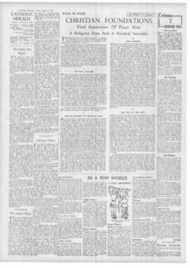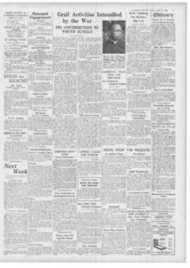Page 8, 16th August 1940
Page 8

Report an error
Noticed an error on this page?If you've noticed an error in this article please click here to report it.
Tags
Share
Related articles
First Lessons Of The War
Hitler's Harvest Crown Huge Peasant Festival
Growing Problem Of World Food
Irish News Letter
Can Famines Be Averted?
HARVEST PROSPECTS
Front Our Agricultural Correspondent It would have been a disaster of the first magnitude if the special effort to develop agricultural production had been rewarded by a bad harvest. Fortunately the probability of this, in view of reports from all parts of the country, is remote.
The investment of so much labour and money as was involved in the spring enterprise was a speculation, but it is a speculation which has generally turned out well.
NOT ENOUGH CAPITAL
Many of the fields so long left derelict are farmed by men who have insufficient capital to pay for the additional cost. There are gaps between the time expenditure is required and the time when either Government aid is received or harvests sold. and these gaps have to be filled, The method by which they are to be filled is the question uppermost just now in the mind of the farming community.
I suggest that the problem be viewed as similar to that of a colonial Government which has to settle a new country. That means starting again on a fresh basis. As it is no uncommon thing in British colonies to finance the settler during the first few years of his venture, and seeing that this method has answered overseas, there seems no reason why it should not answer here.
WHY THE BANKS
By the Emergency Act, farming is already a controlled industry and the corollary of this is that it should receive State aid. A Times correspondent writing on the question makes the pertinent remark " I have never understood why the burden of financing agriculture, if the country wishes it to be financed, should fall on the banks any more than on insurance companies or on any other business.
" If successive Governments had in fact wished to put agricultural credit on a helpful basis, surely they could have done NO on the lines of the Colonial Stock Acts, the whole object of which was to place the Empire in a position of advantage as against foreign countries when borrowing."
Referring to the 5 per cent. interest demanded by the banks, The Farmers' Weekly. arguing for State aid, makes another useful parallel. "What riles some folk," it says, is to hear Sir Kingsley Wood persistently telling us that it is impossible to get a lower rate of interest. That's all my eye! Maybe he hasn't been Chancellor long enough to remember the millions loaned to the railways at 2+ per cent.
" The railways weren't State controlled when the 2-} per cent. loans were made. A guaranteed market with the State as buyer should be sufficient for any financier with a spark of patriotism in his soul to lend at 21 per cent."
blog comments powered by Disqus









